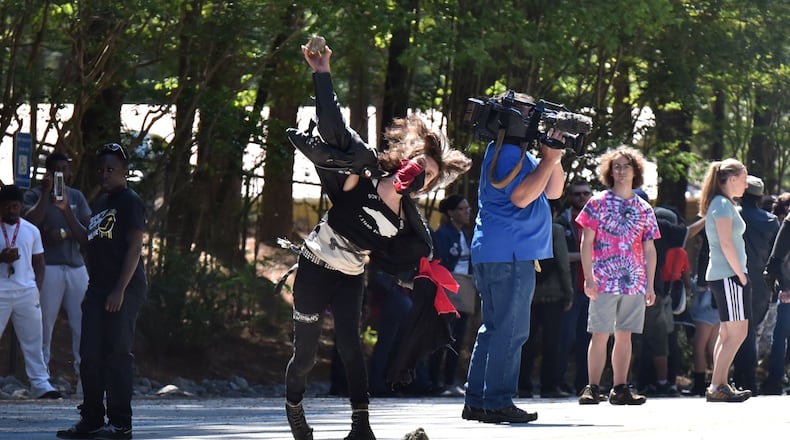Confronted with an angry crowd that threw rocks and smoke bombs, police at Stone Mountain Park Saturday turned to a seldom-used Georgia law making it illegal to wear a mask.
With a few exceptions - like Halloween, theater productions and sporting events - it is against the law in the state to wear face coverings, like masks.
The law was enacted in 1951 to combat the Ku Klux Klan. That presented a certain irony Saturday as it was used to arrest eight demonstrators protesting a white supremacist rally.
While some questioned use of the obscure law, police officials argued it was an appropriate measure to handle an unruly crowd.
Saturday's events unfolded after about two-dozen white power supporters showed up at a "Rock Stone Mountain" rally at the DeKalb County park. Counter-protesters marching under the name All Out ATL wrangled, sometimes violently, with police as they strove to confront the white supremacists, confined to a remote parking lot. A few hundred counter-protesters walked into the park trying to reach the rally. At one point they were blocked by police in riot gear and darted through woods trying to flank the authorities.
Some were wearing Guy Fawkes-like masks favored by the online activist group Anonymous. Others wore ski masks or draped bandanas across the lower half of their faces.
All Out ATL formed in January specifically to counter the white supremacist rally. It is made up of progressive and other left-leaning groups, including student groups, anti-fascist organizations and labor groups, as well as elements of the Black Lives Matter and Occupy movements.
So why did police employ an anti-mask law?
Wearing a mask at a public protest is “intimidating,” said John Bankhead, a spokesman for the Stone Mountain Park Police.
Bankhead said the arrests sent a message that police were willing to put people in jail.
Police chose not to employ more aggressive measures such as making mass arrests, he said, because such actions could have escalated into a melee and disrupted their overall goal: block the counter-protesters from the white power rally.
“Some of (the counter-protesters) might have gotten away and made their way down to the ‘Rock’ group and caused harm,” Bankhead said.
None from the white power rally were arrested; nor did they confront police or other demonstrators.
Bankhead believes employing the mask law was a successful police tactic. It accomplished arrests without escalating the confrontation. In the end, the counter-protesters, while getting in sight of the white power rally, never made it closer than 150 yards away.
Frank Rotondo, executive director of the Georgia Association of Chiefs of Police, said using the mask law is a good strategy to prevent a volatile situation from getting worse.
“There’s no reason to wear a mask in warm weather in a tumultuous situation,” he said.
But Corey Martin of All Out ATL questioned use of the charge.
“It was just a tool for them to suppress the crowd,” he said. Martin called the police “despicable” and said their tactics “showed their true colors.”
The use of a rarely-enforced law can raise questions about the legitimacy of the arrests, said Dean Dabney, an associate criminology professor at Georgia State University.
“It draws attention to an arrest,” he said.
Georgia law bans the wearing of masks, hoods or other devices that conceal a person’s identity. The ban applies on public property or on private property where the owner hasn’t consented.
There are exceptions. Those include traditional holiday costumes being worn on the holiday, protective gear worn by players at sporting events, masks used in theatrical productions and gas masks worn in a drill or an emergency.
Violating the law is misdemeanor and the eight people charged Saturday were released after posting bond.
About a dozen states have adopted anti-mask laws, most to battle the Klan during the middle of the 20th century, said Mark Potok, a senior fellow at the Southern Poverty Law Center. The law has survived several court challenges, and helped weaken support for the Klan.
In 1990, Shade Miller Jr., a Ku Klux Klansman, donned a hood on the Lawrenceville Square, sparking a constitutional challenge to the state’s 1951 mask law.
The State Court of Gwinnett County agreed with Miller’s argument that the First Amendment protected his right to wear a mask. But the Georgia Supreme Court overturned the Gwinnett court’s ruling in December 1990, concluding masks still could be used to terrorize and intimidate. The Supreme Court said the anti-mask law does not infringe upon free speech and free association rights.
In addition to the mask violations, one counter-protester was charged with aggravated assault, a felony.
Joshua Taylor Taft, 21, allegedly threw a smoke grenade at law enforcement officers posted at the rally, police said.
But supporters of the musician from Savannah say he was sitting on a bench smoking a cigarette when three officers pulled him to the ground and arrested him, according to Facebook posts.
From the back of a police van, Taft was able to make a short video of himself, which he posted on Facebook himself.
“I think I’m being charged with throwing pipe bombs,” Taft said. “I didn’t throw anything.”
Taft was booked into the DeKalb County jail. He was released Sunday after posting $2,500 bond, jail records showed.
Bankhead said ultimately the day ended with relatively few arrests and injuries and the groups went their separate ways.
“I think it was successful. It had the potential to be a lot worse,” he said.
About the Author
Keep Reading
The Latest
Featured



